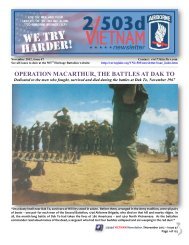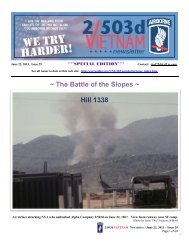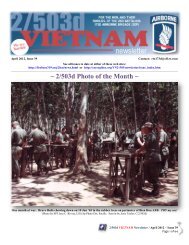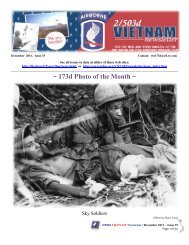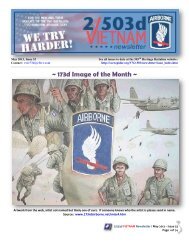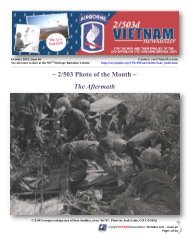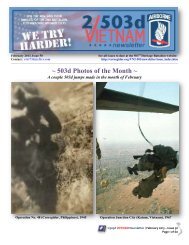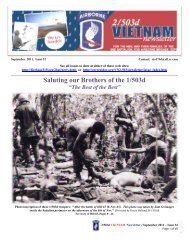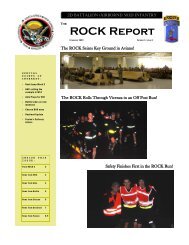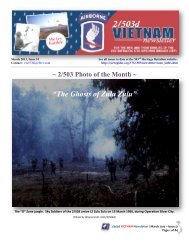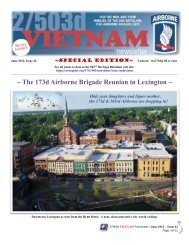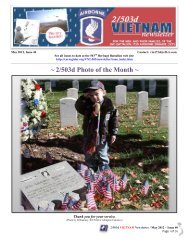2/503d Vietnam - Corregidor
2/503d Vietnam - Corregidor
2/503d Vietnam - Corregidor
Create successful ePaper yourself
Turn your PDF publications into a flip-book with our unique Google optimized e-Paper software.
PTSD Fact Sheet<br />
What is Posttraumatic Stress Disorder?<br />
Posttraumatic Stress Disorder, or PTSD, is a psychiatric<br />
disorder that can occur following the experience or<br />
witnessing of life-threatening events such as military<br />
combat, natural disasters, terrorist incidents, serious<br />
accidents, or violent personal assaults like rape. People<br />
who suffer from PTSD often relive the experience through<br />
nightmares and flashbacks, have difficulty sleeping, and<br />
feel detached or estranged, and these symptoms can be<br />
severe enough and last long enough to significantly impair<br />
the person's daily life.<br />
PTSD is marked by clear biological changes as well as<br />
psychological symptoms. PTSD is complicated by the fact<br />
that it frequently occurs in conjunction with related<br />
disorders such as depression, substance abuse, problems of<br />
memory and cognition, and other problems of physical and<br />
mental health. The disorder is also associated with<br />
impairment of the person's ability to function in social or<br />
family life, including occupational instability, marital<br />
problems and divorces, family discord, and difficulties in<br />
parenting.<br />
Understanding PTSD<br />
PTSD is not a new disorder. There are written accounts of<br />
similar symptoms that go back to ancient times, and there is<br />
clear documentation in the historical medical literature<br />
starting with the Civil War, when a PTSD-like disorder was<br />
known as "Da Costa's Syndrome." There are particularly<br />
good descriptions of posttraumatic stress symptoms in the<br />
medical literature on combat veterans of World War II and<br />
on Holocaust survivors.<br />
Careful research and documentation of PTSD began in<br />
earnest after the <strong>Vietnam</strong> War. The National <strong>Vietnam</strong><br />
Veterans Readjustment Study estimated in 1988 that the<br />
prevalence of PTSD in that group was 15.2% at that time<br />
and that 30% had experienced the disorder at some point<br />
since returning from <strong>Vietnam</strong>.<br />
PTSD has subsequently been observed in all veteran<br />
populations that have been studied, including World War<br />
II, Korean conflict, and Persian Gulf populations, and in<br />
United Nations peacekeeping forces deployed to other war<br />
zones around the world. There are remarkably similar<br />
findings of PTSD in military veterans in other countries.<br />
For example, Australian <strong>Vietnam</strong> veterans experience<br />
many of the same symptoms that American <strong>Vietnam</strong><br />
veterans experience.<br />
PTSD is not only a problem for veterans, however.<br />
Although there are unique cultural and gender-based<br />
aspects of the disorder, it occurs in men and women, adults<br />
and children, Western and non-Western cultural groups,<br />
and all socioeconomic strata. A national study of American<br />
civilians conducted in 1995 estimated that the lifetime<br />
prevalence of PTSD was 5% in men and 10% in women.<br />
Hey Trooper. You think you are alone? You’re not.<br />
Help is available brother. You earned it, you deserve<br />
it, and you’re entitled to it. Help is there for the<br />
asking.<br />
FREE PTSD AWARENESS<br />
SESSIONS TO BE HELD AT THE<br />
173d REUNION IN NORTH<br />
MYRTLE BEACH THIS JUNE<br />
The difficult thing about confronting this illness is, it<br />
demands you look at yourself and your life. It requires<br />
you to uncover your demons; it necessitates you<br />
admitting you have some problems; and the hardest<br />
damn thing of all is, it forces you to ask for help....the<br />
one thing most of us have never been good at doing.<br />
While there is no magic cure or pill you can take for Post<br />
Traumatic Stress Disorder, there is treatment available<br />
which will better help you, and your bride or companion,<br />
and your kids, live with it.<br />
A unique opportunity will be made available to us all,<br />
including our partners, at the reunion this coming June.<br />
Dr. Scott Fairchild (ex LTC 82 nd Airborne), and Col.<br />
Judy Mathewson (active Air Force), are recognized and<br />
renown experts on the illness and in treating vets and<br />
their spouses.<br />
Sessions will be held on Friday, June 4, from noon to<br />
3:30 p.m. in the Tree Top Lounge, and include:<br />
PTSD BASICS<br />
VA DISABILITY PROCESS<br />
RELATIONSHIP ISSUES - COUPLES<br />
RELATIONSHIP ISSUES - VETS<br />
RELATIONSHIP ISSUES - SPOUSES/PARTNERS<br />
Doc Scott and Col. Judy will walk us through what<br />
PTSD is, the countless ways it manifests itself in our<br />
daily lives, ways many of us are unaware. They’ll<br />
explain treatment options available through the VA and<br />
in the private sector, and will provide answers to our<br />
questions, even those questions we don’t know to ask.<br />
Also addressed will be the many issues facing spouses<br />
and partners of combat vets who knowingly or<br />
unknowingly have been impacted by their vet’s time at<br />
war, and how these relationships can be improved and<br />
even saved. Learn about the VA claim process available<br />
to us as we seek treatment and compensation for this<br />
disability.<br />
Please do yourself, your wife, your kids and your<br />
grandkids a favor, attend these sessions.<br />
2/<strong>503d</strong> VIETNAM Newsletter / May 2010 - Issue 15<br />
Page 28 of 62



